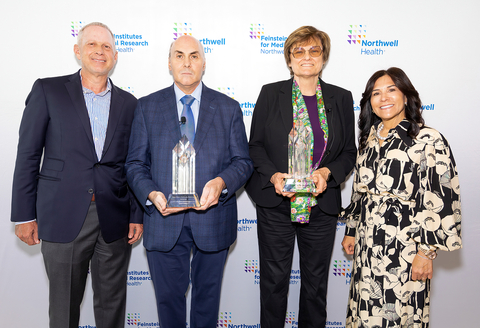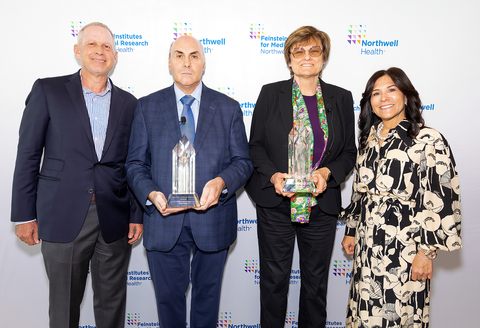MANHASSET, N.Y.--(BUSINESS WIRE)--The Feinstein Institutes for Medical Research congratulates two scientists from the University of Pennsylvania Perelman School of Medicine, Katalin Karikó, PhD, and Drew Weissman, MD, PhD, for being awarded the 2023 Nobel Prize in Physiology or Medicine for their groundbreaking messenger RNA (mRNA) research that helped develop mRNA-based coronavirus disease 2019 (COVID-19) vaccines. In 2022, the duo was awarded the Feinstein Institutes’ 2022 Ross Prize in Molecular Medicine for their work.
Now in its 10th year, the Ross Prize is made possible by the generosity of Feinstein Institutes board vice chairman Jack Ross and his wife, Robin, senior principal gifts officer at the Northwell Health Foundation. Established in 2013, the Ross Prize is awarded annually through the Feinstein Institutes’ peer-reviewed, open-access journal Molecular Medicine. The prize includes a $50,000 award and is given to investigators whose research shows high potential for transforming how we treat and cure disease. The research pair was honored on June 7, 2022 with the New York Academy of Sciences (NYAS) in New York City. Drs. Karikó and Weissman gave a keynote presentation during the symposium, sharing the history of their work, challenges and accomplishments and words of insight.
“Drs. Karikó and Weissman are pioneers whose unrelenting research helped unlock our understanding of mRNA. Their work revolutionized the development of vaccines that saved many lives from COVID-19,” said Kevin J. Tracey, MD, president and CEO of the Feinstein Institutes and Karches Family Distinguished Chair in Medical Research and editor emeritus of Molecular Medicine. “On behalf of the 5,000 scientists and staff at the Feinstein Institutes, we offer our most heartfelt congratulations – thank you for being role models to the scientific community.”
The duo is heralded for inventing the mRNA technology used in Pfizer-BioNTech and Moderna's vaccines to prevent COVID-19 infection. For more than two decades, Drs. Karikó and Weissman studied mRNA to understand how to harness gene information and create new, more effective vaccines. Tapping mRNA technology has unlocked genes to create a blueprint for making proteins that help the body to function. The pandemic has illuminated its vast potential for an array of medical breakthroughs.
“Drs. Karikó and Weissman's embody what the Ross Prize represents; dedication, passion and the dogged pursuit of scientific knowledge to cure disease and help others,” said Jack Ross, vice chairman of the Feinstein Institutes’ board of directors. “We are thrilled on their behalf and proud to have contributed to their future endeavors.”
Drs. Karikó and Weissman’s early mRNA discoveries have laid the foundation for swift vaccine development – Pfizer-BioNTech designed its coronavirus vaccine in a matter of hours with Moderna quick to follow. More than a billion COVID-19 mRNA vaccines have been administered worldwide.
To listen to a special Northwell Health 20-Minute Health Talk podcast featuring Drs. Karikó and Weissman at the 2022 Ross Prize symposium, click here.
In May 2023, The Feinstein Institutes selected two scientists from the University of Texas Southwestern Medical Center, Helen H. Hobbs, MD, and Jonathan C. Cohen, PhD, to receive the 10th annual Ross Prize in Molecular Medicine for groundbreaking research in dyslipidemias and metabolic liver disease. This team was the first to discover the genetic cause of fatty liver disease in humans and their ongoing work has led to a new class of drugs that lower cholesterol.
To learn more about the Ross Prize and symposium click here. If you would like to nominate a candidate for the 2024 Ross Prize, please make a submission here.
Past recipients of the Ross Prize are: Helen H. Hobbs, MD, Howard Hughes Medical Institute investigator, director of the Eugene McDermott Center for Human Growth; Jonathan C. Cohen, PhD, professor of Internal Medicine, Center for Human Nutrition and Eugene McDermott Center for Human Growth and Development; Katalin Karikó, PhD, University of Pennsylvania Perelman School of Medicine, adjunct professor and senior vice president at BioNTech; Drew Weissman, MD, PhD, University of Pennsylvania Perelman School of Medicine Roberts Family Professor of Vaccine Research; Adrian R. Krainer, PhD, Cold Spring Harbor Laboratory Professor; Daniel Kastner, MD, PhD, the National Institutes of Health's National Human Genome Research Institute scientific director; Huda Y. Zoghbi, MD, professor, Departments of Pediatrics, Molecular and Human Genetics, Neurology and Neuroscience at Baylor College of Medicine; Jeffrey V. Ravetch, MD, PhD, the Theresa and Eugene M. Lang Professor and head of the Leonard Wagner Laboratory of Molecular Genetics and Immunology at The Rockefeller University; Charles N. Serhan, PhD, DSc, director of the Center for Experimental Therapeutics and Reperfusion Injury at Brigham and Women's Hospital, the Simon Gelman Professor of Anaesthesia at Harvard Medical School and professor at Harvard School of Dental Medicine; Lewis C. Cantley, PhD, the Meyer Director of the Sandra and Edward Meyer Cancer Center at Weill Cornell Medical College and New York-Presbyterian Hospital; John J. O'Shea, MD, scientific director at the National Institute of Arthritis and Musculoskeletal and Skin Diseases; and Dan R. Littman, MD, PhD, the Helen L. and Martin S. Kimmel Professor of Molecular Immunology in the Skirball Institute of Biomolecular Medicine at New York University School of Medicine.
About the Feinstein Institutes
The Feinstein Institutes for Medical Research is the home of the research institutes of Northwell Health, the largest health care provider and private employer in New York State. Encompassing 50 research labs, 3,000 clinical research studies and 5,000 researchers and staff, the Feinstein Institutes raises the standard of medical innovation through its five institutes of behavioral science, bioelectronic medicine, cancer, health system science, and molecular medicine. We make breakthroughs in genetics, oncology, brain research, mental health, autoimmunity, and are the global scientific leader in bioelectronic medicine – a new field of science that has the potential to revolutionize medicine. For more information about how we produce knowledge to cure disease, visit http://feinstein.northwell.edu and follow us on LinkedIn.
About Molecular Medicine
Molecular Medicine sits at the forefront of its field, rapidly disseminating discovery in the genetic, molecular, and cellular basis of physiology and disease across a broad range of specialties. With over two decades of experience publishing to a multidisciplinary audience, and continually celebrating innovation through the ‘Ross Prize in Molecular Medicine’ and ‘Anthony Cerami Award in Translational Medicine’, the journal strives towards the design of better molecular tools for disease diagnosis, treatment, and prevention. Molecular Medicine is published by BMC, part of Springer/Nature, in partnership with The Feinstein Institutes for Medical Research.
About the New York Academy of Sciences
The New York of Academy of Sciences is an independent, not-for-profit organization that since 1817 has been committed to advancing science for the benefit of society. With more than 20,000 Members in 100 countries, the Academy advances scientific and technical knowledge, addresses global challenges with science-based solutions, and sponsors a wide variety of educational initiatives at all levels for STEM and STEM related fields. The Academy hosts programs and publishes content in the life and physical sciences, the social sciences, nutrition, artificial intelligence, computer science, and sustainability. The Academy also provides professional and educational resources for researchers across all phases of their careers. Please visit us online at www.nyas.org.




